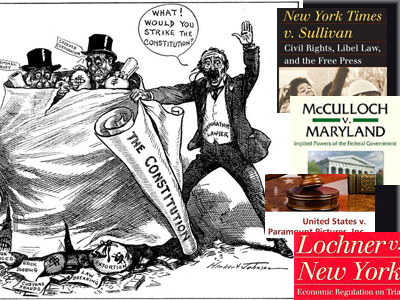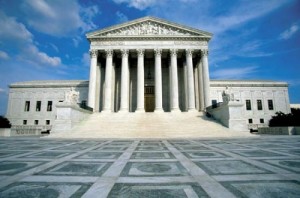Supreme Court deliberations can seem opaque and perplexing to reporters who haven’t had constitutional history classes, or spent time covering courts. But a basic understanding of how the court operates is a vital tool in a business journalist’s toolbox.
Throughout its history, the Supreme Court has decided numerous cases that deal with business matters. In that vein, the current debate over same-sex marriage is more than just a social issue. The court’s ruling will have tax, insurance, health care, and needless to say, legal implications that could have a significant impact in many places.
As we wait for the justices’ decision in the challenges to the Defense of Marriage Act and California’s Proposition 8, here are 10 cases that every business journalist should know.
1) Marbury vs. Madison, 1803.
The case established the Supreme Court as the ultimate decision-maker on the validity of actions passed by Congress. The case gave the court the power to review any new laws in the case of any conflicts with the Constitution and to judge whether they were consistent with the Constitution’s legal guidelines.
2) McCulloch vs. Maryland, 1819.
This decision gave Congress the right to pass laws creating methods for the U.S. government to conduct its business. The case dealt with whether Congress had the right to create a central bank. The court decided that it did. Interestingly, the Federal Reserve itself was not created until the Federal Reserve Act of 1913.
3) Munn vs. Illinois, 1877.
The Supreme Court decided that companies that serve the public interest can be regulated by the government. The case got to the court on an appeal of an Illinois law, which set rates that private companies could charge in transporting agricultural products. Munn is the precedent for the regulation of the airline, automobile, railroad, and shipping industries, and many others.
4) Lochner vs. New York State, 1905.
In a decision that is still debated today, the Supreme Court ruled that employees have the exclusive right to contract with their employers, and states could not pass laws that would interfere with that relationship. In the Lochner case, the state of New York limited bakers to a 60-hour workweek. The court ruled that the law interfered with the “liberty” of the bakers since no other types of workers were affected by the law.
5) Standard Oil of New Jersey vs United States. 1911.
The Supreme Court found Standard Oil guilty of monopolizing the petroleum industry through a series of anti-competitive actions. The court ordered the breakup of Standard Oil, and fines against a number of officials, including John D. Rockefeller. Through the years, Standard Oil has been used as a curb on many big companies, such as General Motors, drug makers and energy companies.
6) West Coast Hotel vs. Parrish, 1937.
The case upheld the constitutionality of Washington State’s minimum wage law, and in doing so, essentially took apart the Lochner decision. The court said that states indeed had the power to restrict workers’ “liberty,” when the restriction protected public health, individual workers’ safety, and vulnerable groups (such as women and children). The ruling came after earlier courts had struck down many of Franklin Roosevelt’s New Deal efforts, prompting FDR to threaten to “pack the court” with friendlier judges.
7) United States vs. Paramount Pictures, 1948.
Since the beginning of the movie industry, the studios had owned their own theater chains, which could show only the films of the studio that owned them. That created an anti-competitive situation, the court decided. It forced the major studios to divest of their movie houses and banned the practice of block booking, in which theaters were required to take films without even seeing them. The case is considered a landmark in the business practice of vertical integration, or the ownership of suppliers and customers.
8 ) New York Times vs. Sullivan, 1964.
The newspaper had published an ad critical of an Alabama official, prompting him to successfully sue for libel. The court overturned the ruling, saying that in order to protect debate about public officials, journalists had to have the right to print what they knew to be correct. Unless a journalist had demonstrated “reckless disregard for the truth,” he or she could not be sued by a public figure for libel.
9) Citizens United vs. Federal Election Commission, 2008.
The Supreme Court held that the first amended bars the government from restricting independent campaign spending by corporations, independent groups, associations and labor unions. The ruling resulted in the creation of Super PACs (political action committees) whose presence became notable during the 2012 Presidential election cycle.
10) National Federation of Independent Businesses vs Sebelius, 2012.
This case upheld the Affordable Care Act, better known as Obamacare, which requires that virtually all Americans purchase health care, if they cannot obtain it where they work. The court ruled that Congress had the right to impose the requirement under its tax making powers. Many Supreme Court experts were surprised by the ruling, in which conservative Chief Justice John Roberts sided with moderate and liberal members to reach the majority decision.
RESOURCES
Read about more important Supreme Court cases at ConstitutionFacts.com (PDF)
| Website.
For information about current court cases, follow ScotusBlog.
PBS: Capitalism and Conflict, a 2007 production exploring the history and impact of America’s highest court.









